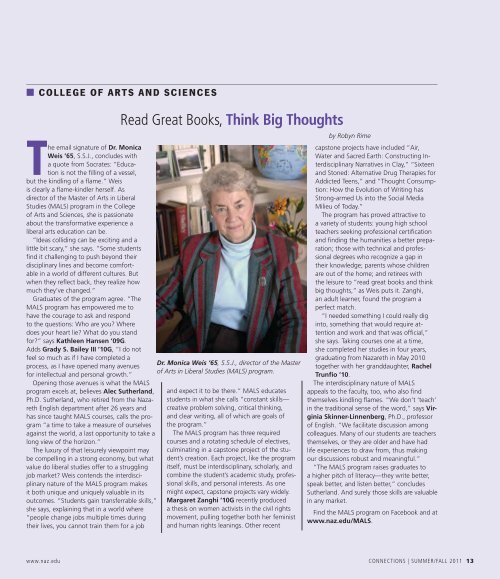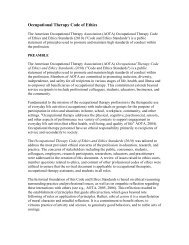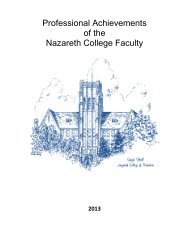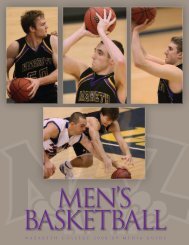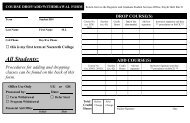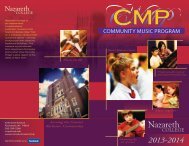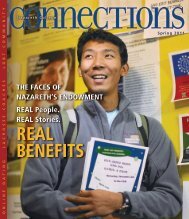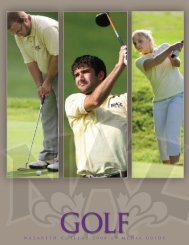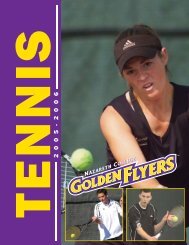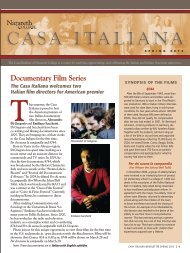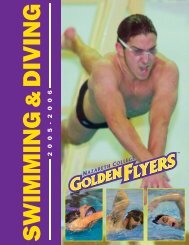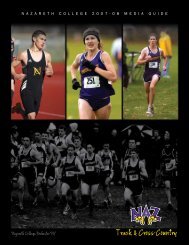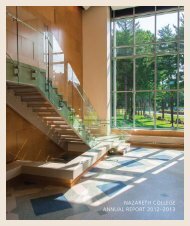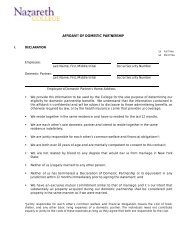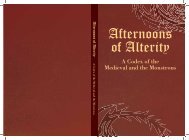SummEr/FAll 2011 - Nazareth College
SummEr/FAll 2011 - Nazareth College
SummEr/FAll 2011 - Nazareth College
You also want an ePaper? Increase the reach of your titles
YUMPU automatically turns print PDFs into web optimized ePapers that Google loves.
n college of arts and sciences<br />
The email signature of Dr. Monica<br />
Weis ’65, S.S.J., concludes with<br />
a quote from Socrates: “Education<br />
is not the filling of a vessel,<br />
but the kindling of a flame.” Weis<br />
is clearly a flame-kindler herself. As<br />
director of the Master of Arts in Liberal<br />
Studies (MALS) program in the <strong>College</strong><br />
of Arts and Sciences, she is passionate<br />
about the transformative experience a<br />
liberal arts education can be.<br />
“Ideas colliding can be exciting and a<br />
little bit scary,” she says. “Some students<br />
find it challenging to push beyond their<br />
disciplinary lines and become comfortable<br />
in a world of different cultures. But<br />
when they reflect back, they realize how<br />
much they’ve changed.”<br />
Graduates of the program agree. “The<br />
MALS program has empowered me to<br />
have the courage to ask and respond<br />
to the questions: Who are you? Where<br />
does your heart lie? What do you stand<br />
for?” says Kathleen Hansen ’09G.<br />
Adds Grady S. Bailey III ’10G, “I do not<br />
feel so much as if I have completed a<br />
process, as I have opened many avenues<br />
for intellectual and personal growth.”<br />
Opening those avenues is what the MALS<br />
program excels at, believes Alec Sutherland,<br />
Ph.D. Sutherland, who retired from the <strong>Nazareth</strong><br />
English department after 26 years and<br />
has since taught MALS courses, calls the program<br />
“a time to take a measure of ourselves<br />
against the world, a last opportunity to take a<br />
long view of the horizon.”<br />
The luxury of that leisurely viewpoint may<br />
be compelling in a strong economy, but what<br />
value do liberal studies offer to a struggling<br />
job market? Weis contends the interdisciplinary<br />
nature of the MALS program makes<br />
it both unique and uniquely valuable in its<br />
outcomes. “Students gain transferrable skills,”<br />
she says, explaining that in a world where<br />
“people change jobs multiple times during<br />
their lives, you cannot train them for a job<br />
Read Great Books, Think Big Thoughts<br />
Dr. Monica Weis ’65, S.S.J., director of the Master<br />
of Arts in Liberal Studies (MALS) program.<br />
and expect it to be there.” MALS educates<br />
students in what she calls “constant skills—<br />
creative problem solving, critical thinking,<br />
and clear writing, all of which are goals of<br />
the program.”<br />
The MALS program has three required<br />
courses and a rotating schedule of electives,<br />
culminating in a capstone project of the student’s<br />
creation. Each project, like the program<br />
itself, must be interdisciplinary, scholarly, and<br />
combine the student’s academic study, professional<br />
skills, and personal interests. As one<br />
might expect, capstone projects vary widely.<br />
Margaret Zanghi ’10G recently produced<br />
a thesis on women activists in the civil rights<br />
movement, pulling together both her feminist<br />
and human rights leanings. Other recent<br />
by Robyn Rime<br />
capstone projects have included “Air,<br />
Water and Sacred Earth: Constructing Interdisciplinary<br />
Narratives in Clay,” “Sixteen<br />
and Stoned: Alternative Drug Therapies for<br />
Addicted Teens,” and “Thought Consumption:<br />
How the Evolution of Writing has<br />
Strong-armed Us into the Social Media<br />
Milieu of Today.”<br />
The program has proved attractive to<br />
a variety of students: young high school<br />
teachers seeking professional certification<br />
and finding the humanities a better preparation;<br />
those with technical and professional<br />
degrees who recognize a gap in<br />
their knowledge; parents whose children<br />
are out of the home; and retirees with<br />
the leisure to “read great books and think<br />
big thoughts,” as Weis puts it. Zanghi,<br />
an adult learner, found the program a<br />
perfect match.<br />
“I needed something I could really dig<br />
into, something that would require attention<br />
and work and that was official,”<br />
she says. Taking courses one at a time,<br />
she completed her studies in four years,<br />
graduating from <strong>Nazareth</strong> in May 2010<br />
together with her granddaughter, Rachel<br />
Trunfio ’10.<br />
The interdisciplinary nature of MALS<br />
appeals to the faculty, too, who also find<br />
themselves kindling flames. “We don’t ‘teach’<br />
in the traditional sense of the word,” says Virginia<br />
Skinner-Linnenberg, Ph.D., professor<br />
of English. “We facilitate discussion among<br />
colleagues. Many of our students are teachers<br />
themselves, or they are older and have had<br />
life experiences to draw from, thus making<br />
our discussions robust and meaningful.”<br />
“The MALS program raises graduates to<br />
a higher pitch of literacy—they write better,<br />
speak better, and listen better,” concludes<br />
Sutherland. And surely those skills are valuable<br />
in any market.<br />
Find the MALS program on Facebook and at<br />
www.naz.edu/MALS.<br />
www.naz.edu CONNECTIONS | Summer/Fall <strong>2011</strong> 13


